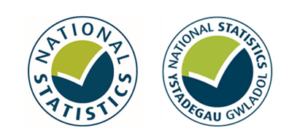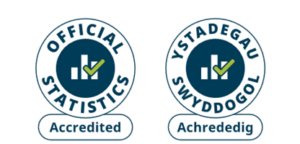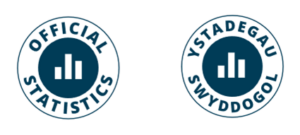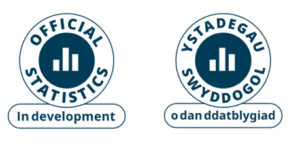Part 2
(a) National Statistics and official statistics labelling
The call to evidence is now closed. This document is intended for reference purposes only.
National Statistics are official statistics that OSR has independently reviewed and confirmed comply with the standards of trustworthiness, quality and value in the Code of Practice for Statistics. Office for Statistics Regulation (OSR) has been exploring how National Statistics designation is understood and how to make sure it is useful today. In January 2022, the UK Statistics Authority Board approved an exploration of ways to adapt and clarify the label of ‘National Statistics’.
As a result, in September we will introduce the explanation that ‘National Statistics are accredited official statistics’. We will rename ‘experimental statistics’ as ‘official statistics in development’.
To help clarify the status of different types of official statistics and their relationships to one another, we have developed some new badges that could be shown on published official statistics. These new badges draw on the language we are introducing to help better explain different types of official statistics, and aim to highlight more clearly when something is an official statistic (currently only National Statistics have a badge).
We would like to know your views about whether badges will be helpful. Please tell us your views on the badge designs.
Question 4
Would you prefer to keep the ‘National Statistics’ badges or replace them with ones for ‘accredited official statistics’?
Current National Statistics badges:
Proposed Accredited Official Statistics badges:
Question 5
What are your thoughts on introducing badges for other official statistics, which have not been accredited by OSR?
Proposed Official Statistics badges:
Question 6
‘Official statistics in development’ is the new name for ‘experimental statistics’. What are your thoughts on introducing badges for ‘official statistics in development’?
Proposed Official Statistics in Development badges:
Question 7
Please tell us any other comments you have about signifying the different types of official statistics.
(b) Applying the Code beyond official statistics
Voluntary application of the Code (or VA) is where a producer of data, statistics and analysis which are not official statistics chooses to apply the Code pillars to help them produce analytical outputs that are high quality, useful for supporting decisions, and well respected. The VA scheme began in May 2018, just a few months after the publication of the second edition of the Code. The scheme has grown over the past five years, and we now have 36 adopters in our VA list with published statements of compliance.
We firmly believe that the Code pillars of Trustworthiness, Quality and Value (TQV) are universal and can be useful in all kinds of situations for producing information that is not official statistics. Government analysts are part of our scheme for their work producing other kinds of analysis and information. Other adopters come from a wide range of settings, such as local government, commercial organisations, think tanks, and the charity sector. The scheme has an active community of practice enabling anyone with an interest in TQV to hear from others applying the pillars in areas outside of official statistics.
We established an award for Statistical Excellence in Trustworthiness, Quality and Value, in partnership with the Royal Statistical Society and Civil Service World. We have had a range of winners: the Ministry of Housing, Communities & Local Government for their Building Safety Programme Monthly Data Release, the Scottish Fiscal Commission, the Greenhouse Gas Inventory team in the Department for Business, Energy and Industrial Strategy, the COVID-19 Dashboard Team from the UK Health Security Agency, and most recently, Fable Data.
Question 8
We believe that the Code pillars of Trustworthiness, Quality and Value (TQV) are universal and can be useful in all kinds of situations for producing information that is not official statistics.
How would you like to see voluntary application evolve?
If it’s helpful, please consider:
• Whether the name ‘voluntary application’ is sufficiently transparent and appealing and any ideas for alternatives
• Ways to better market the scheme to analysts and organisations
• The sort of guidance and support that could help the application of TQV
• What accountability would you expect those voluntarily applying TQV to have
• How to encourage continuous improvement in the application of TQV




